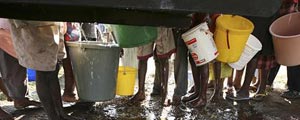
REPORTS that Harare City Council has increased its cholera surveillance programmes following increased human trafficking between Harare and Mozambique’s Tete province must be taken seriously if Zimbabwe is to come up with a cocktail of measures to prevent its spread.
NewsDay comment
This is so because some 19 cholera deaths have already been recorded in Tete, and the fact that there are direct buses to and from Mozambique means that other the local authority must join hands with other stakeholders to ensure surveillance is made easier.
Regrettably, Mozambique described the outbreak as one of the worst disasters to hit southern Africa in years, with over 1 700 cases having been reported in the Nampula, Niassa and Tete provinces.
Zimbabweans have not yet forgotten the massive cholera outbreak in 2008, whose epicentre was reportedly Chitungwiza, where it affected over 4 000 people. There were also pockets of outbreaks in Harare and other parts of the country.
Against this backdrop, it is worrisome that once again, Zimbabwe is exposed to another cholera outbreak following disclosures that there are buses from Road port terminus in Harare ferrying travellers to Tete Province in Mozambique.
Because the country’s borders are porous, it becomes critical that government puts in place measures that the disease will not enter into Zimbabwe. At a time when water is hardly ever available in Harare, cholera is one disease whose outbreak the country cannot afford at this moment.
Although Zimbabwe has been on high alert since the first incidences of cholera in Mozambique, what is disturbing is that there is so much unhindered movement of people between these two countries and consequently, there is no guarantee that the preparedness that has been put in place by the government will suffice.
- Chamisa under fire over US$120K donation
- Mavhunga puts DeMbare into Chibuku quarterfinals
- Pension funds bet on Cabora Bassa oilfields
- Councils defy govt fire tender directive
Keep Reading
The concerns raised by city health director Prosper Chonzi are well–founded and his honesty that it would be difficult to control the movement of people to that area and those that skip the border illegally, needs to be taken very seriously as Zimbabwe is under threat.
Congested places like Mbare bus terminus, Mbare hostels and other highly susceptible areas need to be particularly monitored and measures to safeguard residents must be put in place. This implies that the city authorities should find other ways of ensuring that those areas that often go without water for long periods of time are adequately supplied.
Donor agencies and other international nongovernmental organisations – some of whom drilled 200 boreholes to provide safe drinking water – between 2008 and 2009 crisis period should also come on board again and give a hand.
Mozambique’s recent admission that 19 people died from cholera in flood-hit areas should be a reminder of what can befall Zimbabwe if authorities leave city authorities’ warnings too late.
No doubt Zimbabwe should seriously consider other measures to protect the citizenry from the cholera outbreak without hindering the movement of people from the two neighbouring republics.
We call on authorities to prepare well to deal with the outbreak and ensure that no lives are lost as happened before.











